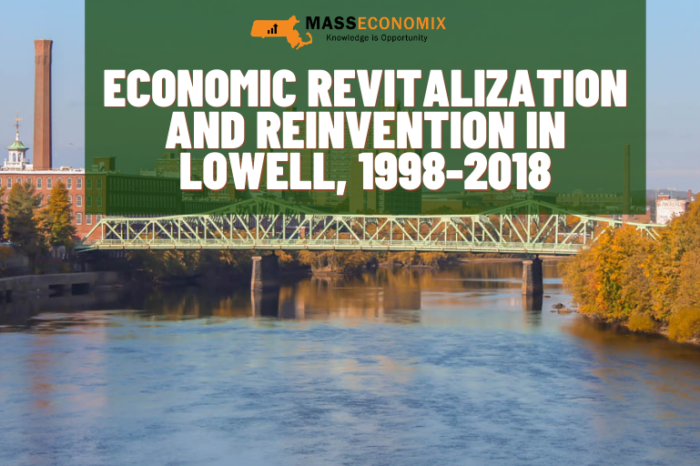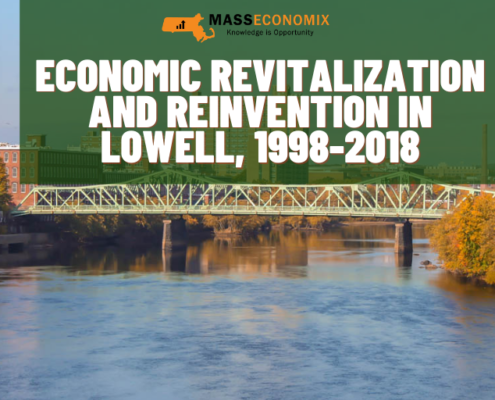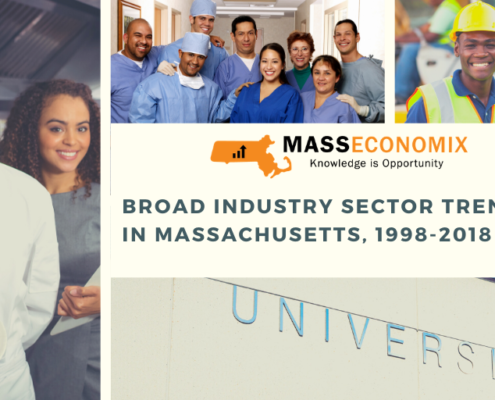Pioneer Report Highlights Employment Growth in Lowell, Massachusetts
BOSTON – In 2018, employment in Lowell, Massachusetts finally surpassed its pre-Great Recession peak, according to a new report from Pioneer Institute that draws data from the MassEconomix web tool. Before COVID-19, job growth in the city was driven largely by a resurgence in manufacturing and a continued high concentration of health care firms.
The report is the first in a series that presents employment and business establishment trends in the Commonwealth’s gateway cities.
In “Economic Revitalization and Reinvention in Lowell, 1998-2018,” two decades of data show fluctuations in employment, firm size, and the share of businesses throughout various sectors in Lowell. Manufacturing tops the list of industries to add the most jobs in Lowell from 2008-2018, with Education and Health Care also comfortably outpacing other industries. It’s unclear how exactly COVID-19 will affect these trends in the long-term.
“While the manufacturing sector is driving much of the growth we’re seeing through 2018, that doesn’t mean there’s been a resurgence of factory jobs,” said Andrew Mikula, who co-authored the report with Serena Hajjar. “Multiple large manufacturing firms have sales and management teams in Lowell, but it’s likely that their production lines are located in places with cheaper land and labor costs.”
At the same time, employment in several industries has shrunk over that time frame, notably Information and Public Administration. By contrast, Community Teamwork Inc., one of Lowell’s largest Health Care establishments, nearly quadrupled in employment. As a whole, employment in the Manufacturing sector more than doubled between 2008 and 2018.
While the total number of employees has remained relatively stable throughout the 20 years, with a significant uptick from 2017 to 2018, the number of business establishments in Lowell has steadily increased from 1998 to 2018. Other industries remain largely stagnant in the city, notably the Finance and Real Estate sectors.
On a per capita basis, the concentration of businesses in Lowell remains persistently below the state average, with 38.8 businesses for every 1,000 Lowell residents in 2018, compared to 54.2 for Massachusetts. “The pandemic has the potential to widen this gap,” said Mikula. “We don’t have a lot of data on business closures at the city level yet, but a permanent shift towards working from home after COVID could erode the significance of Lowell’s central location within the Merrimack Valley.”
All of the reports in Pioneer’s MassEconomix series use the same Your-economy Time Series data to develop aggregated numbers for statewide growth. This data is recorded by Infogroup and compiled by the Business Dynamics Research Consortium (BDRC) at the University of Wisconsin System Institute for Business and Entrepreneurship in Madison, Wisconsin.
Following this report, Pioneer will use these data to release regular publications that create “snapshots” of particular industries.
About the Authors
Andrew Mikula is a Research Assistant. Mr. Mikula was previously a Lovett & Ruth Peters Economic Opportunity Fellow at Pioneer Institute and studied economics at Bates College.
Serena Hajjar is the Roger Perry Government Transparency Intern at the Pioneer Institute, focusing on the effects of the coronavirus response on the state economy, emerging industries, and tax structures. Ms. Hajjar is a recipient of the Fulbright English Teaching Assistant Grant to Russia for the 2020-21 cycle. She has a B.A. in international relations and Russian and Eastern European studies from the University of Pennsylvania.
About Pioneer
Mission
Pioneer Institute develops and communicates dynamic ideas that advance prosperity and a vibrant civic life in Massachusetts and beyond.
Vision
Success for Pioneer is when the citizens of our state and nation prosper and our society thrives because we enjoy world-class options in education, healthcare, transportation, and economic opportunity, and when our government is limited, accountable and transparent.
Values
Pioneer believes that America is at its best when our citizenry is well-educated, committed to liberty, personal responsibility, and free enterprise, and both willing and able to test their beliefs based on facts and the free exchange of ideas.






















